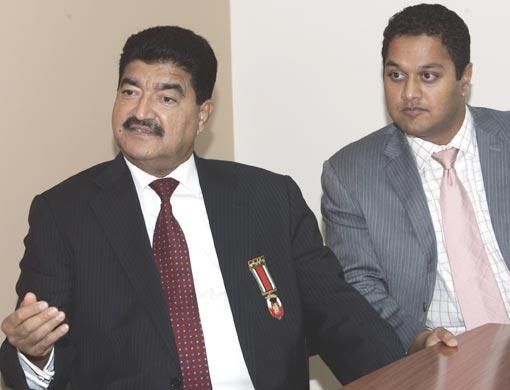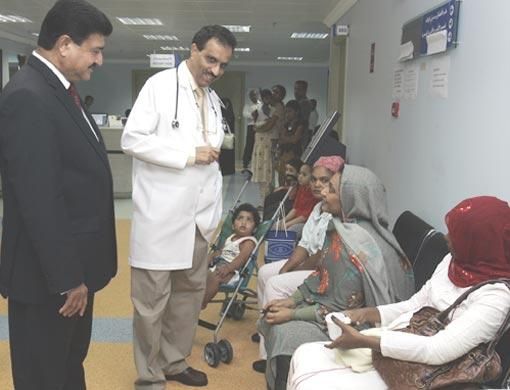Abu Dhabi: He started off with a small flat that he turned into a private medical centre 35 years ago with just one doctor, a dentist and a pathologist. Now he operates over eight medical facilities across the UAE and plans to expand further.
Dr B.R. Shetty arrived in the UAE in 1973. At the time he was not personally committed to anything but working to earn a livelihood as the first outdoor medical representative in the country.
The experience allowed him to remain in close contact with the healthcare services, the market and its characteristics.
In 1975 Shetty established the New Medical Centre (NMC) coinciding with the objective of achieving "quality health for all", which has been the vision of late Shaikh Zayed Bin Sultan Al Nahyan.
He tied the knot a year later, and his wife was the first and the only general practitioner in NMC.
The medical centre went from one room to three floors and is now spread over four buildings along with the 22-storey NMC Tower building, with an excess inflow of around 3,000 visiting patients per day.
"Ever since I arrived in the UAE, I have been committed to treating it as my own country. My wife was the only general practitioner servicing our patients in a one-room clinic and today we have over 480 doctors with multi-specialties," said Shetty.
During the interview, Gulf News learnt that Shetty's only son, Binay R. Shetty, currently the executive director for NMC, was the first child to be born in NMC maternity ward in 1983. Shetty's three daughters are also involved in the family business.
The interview also revealed how the medical industry in the early 1970s evolved into today's highly specialised one.
Competition
Shetty said: "It was harder in the past to own your own building. Only Emiratis were granted that opportunity. However, the UAE opened up a bit two years ago, and now the government allows the expatriates to buy land. Also, in the past, the medical licensing regulations were not as complicated as now."
One of the most obvious changes from the past is the competition in the healthcare sector but the infrastructure is insufficient to be able to cope with the rising demand, he said.
"I feel medical treatment among private clinics in the past was of higher quality, but now [there is a] lack of doctors and nurses, who in order to get a license to work in the UAE have to pass an exam and go through a long process that takes six months, which is too long.
"Our primary concern has always been to provide proper patient care, but these days they have to wait for as long as three to four hours to see a doctor, which is extremely traumatising for the patients and also for me. Patients are becoming impatient but at no fault of ours," said Shetty.
The lack of licensed doctors to cope with the demand is a major frustration with the medical sector, he said.
"I thank the Royal Family for introducing the compulsory health insurance for all; this has definitely proved beneficial to all the people."
There has been an increase in the number of patients since the implementation of compulsory health insurance two years ago, said Shetty, which leads to an increase in patient's waiting time up to three to four hours and there's a 50 per cent increase in walk-in patients.
"I used to be very strict about patient waiting time in the past but now I feel like crying because I know there is nothing in my hands to do," said Shetty.
Looking back, Shetty said, introducing the private medical care 30 years back was a huge challenge.
"That time, under the benevolence of the late Shaikh Zayed Bin Sultan Al Nahyan, the government was providing free medical service for all. So to start a private clinic and put a charge for the facilities was indeed a huge risk," said Shetty. "But we were able to make a difference through our services and were welcomed by the local community."
"In 1982 I introduced the first CAT (CT) scan in the private sector which cost me a fortune.
"At the time, patients used to travel abroad to get a CT scan. My accountant suggested it may not be feasible and affordable to purchase a CT [machine] and advised me to drop the idea, but I trusted my intuition and purchased [it].
"Shortly after that, through CT scan our doctors diagnosed the first tumour [the size of a coconut] pressing the optical nerve on a 14-year-old pupil. From then on, patients started to trust us and the budget spent on the CT [machine] came back to us with an inflow of 250 patients per day."
Shetty, however, feels that the healthcare sector needs more Emiratis.
"We need more Emiratis to enter the healthcare sector. At the end of our journey, our job will be to pass over our experiences to our Emirati brothers and sisters.
"The UAE needs more nursing schools. We only have two at the moment that are sponsored by the authority.
"Under present circumstances, I would like more colleges and more medical persons, including doctors, nurses, pharmacists, and technicians."
Gradual growth
Speaking on ways to improve the current healthcare regulations, Shetty said: "We all know an apple is good for the health. But it is also important to eat it in pieces, we cannot swallow the apple in one go."
"I feel there must be phase by phase improvement. We all want the same thing, improvement and customer satisfaction. So let's all work together to accomplish that.
"Daman and the Health Authority are trying to help us during this increased demand."
Shetty is at present looking for land in Abu Dhabi to expand NMC services and is also working on getting accredited by the Joint Commission International (JCI).
Expansion plans
"In two years from now, we plan to open more hospitals and would like to expand our network.
"We will also be expanding in India, Kuwait, Oman, and Doha."
As for his future plans, he said: "I will continue to expand [NMC] and work till my death. I would like to contribute towards improving the medical facilities. We want to be the best hospital.
"As part of backward [sector] integration, I started the country's first pharmaceutical factory and it is doing well. I have also ventured into biotechnology and nanotechnology in order to improve further.
"We have already introduced Abraxane as part of biotechnology.
"I believe today's innovation will bring in tomorrow's cure for the beneficial of the people. Our contribution to the society is extremely important. I love the UAE, it is the best country in the world and I will serve it till the last drop of blood I have," said Shetty.
We need more Emiratis to enter the healthcare sector. At the end of our journey, our job will be to pass over our experiences to our Emirati brothers and sisters. The UAE needs more nursing schools. We only have two at the moment."














